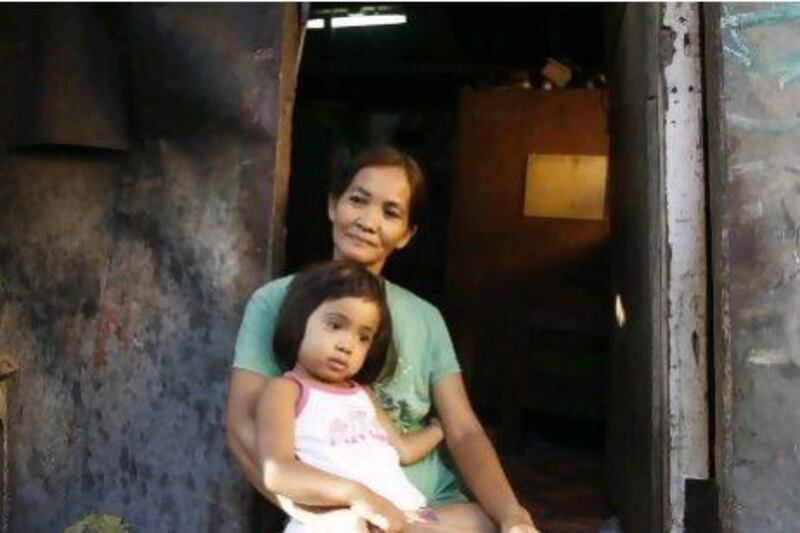MANILA // Fe Capco and her five children live in a shack with no running water along a dirt track in eastern Manila. She earns about 4,200 pesos (Dh365) a month washing clothes and her husband used to bring in about 3,000 pesos a month driving a motorcycle taxi until he went blind.
But things are better than they used to be.
Through a programme in the Philippines called Pantawid Pamilya (Family Subsistence), three million poor households like Mrs Capco's get small grants from the government if they keep their children in school and take them regularly to health centres.
"It's really a big help because now we don't have a problem about whether we can have food to eat or if the kids have money to go to school," Mrs Capco, 43, said with her daughter Rihanna, 2, in her lap.
A high-school graduate with gleaming eyes and a ready smile, Mrs Capco has been in the ramshackle community for 18 years. None of her neighbours has a steady job.
With a quarter of its people below the poverty line as the population crests 100 million, the Philippines points to the need for developing Asia to reverse worsening inequality and broaden the benefits of the region's tremendous economic growth.
Conditional Cash Transfer schemes like Pantawid Pamilya - so named for the conditions imposed to qualify for benefits - were pioneered in Brazil and Mexico and have proven very effective in giving immediate help to the poor and breaking vicious cycles of poverty by improving health, education and opportunities.
Narrowing the wealth gap has become as pressing as poverty alleviation, making it a key theme of this week's annual meeting of the Asian Development Bank (ADB) in Manila with government officials, bankers and civil society groups from 67 countries.
Inequality is rising in 11 countries making up 82 per cent of Asia's population, the ADB says. That list includes China, India and Indonesia - three huge economies driving much of the growth.
"Relative to other regions, the recent period of growth in Asia has been both less inclusive and less pro-poor," the International Monetary Fund said in a report.
Even wealthy countries are feeling the pain.
In Japan, the world's third-largest economy, a rapidly ageing society is putting pressure on a pension system designed when it was assumed contributions would rise in perpetuity.
In South Korea, the 15th-largest economy, relative poverty has worsened, the Organisation for Economic Co-operation and Development said.
In 1990, about 8 per cent of South Koreans lived on less than half of the median income. Now it is about 15 per cent.
For Rajat Nag, the ADB's managing director general, growing inequality "threatens to undermine the region's stability".
Governments in Asia have the resources to promote inclusive growth, he said last month, and they should adopt more targeted social spending. That means rolling back poorly focused schemes like fuel subsidies in Indonesia that the government finds hugely costly but politically difficult to kill.
"Countries have often felt that they first need to grow and they need to grow fast," Mr Nag said. "But a principle of rising tides will lift all boats makes an assumption that no boat has a hole in the hull."
Conditional Cash Transfer schemes in the Philippines and Indonesia - and more limited ones in Bangladesh, Pakistan and Cambodia - are seen as one of the best ways to target spending.
Pantawid Pamilya, piloted in 2007, is now the largest social protection scheme in the Philippines. The monthly grants of up to 1,400 pesos go to the mother, as experience shows women tend to spend the money on food, medicine and school supplies.
"From the beginning, the programme was very well designed," Nazmul Chaudhury, the World Bank's point person for Pantawid Pamilya, said.
Mrs Capco and her neighbours live a short drive from the Makati business district where manicured squares, office towers, fancy hotels and expensive boutiques might mislead the casual visitor into thinking the Philippines is a wealthy country.
Reality is more squalid for many of the 13 million people in congested Manila, including nearly 600,000 families classified as "informal settlers" - a polite term for squatters like Mrs Capco.
Clashes in the capital last month between 1,500 squatters and policemen trying to enforce a court-ordered demolition of makeshift stalls left one man dead and dozens hurt. Residents pelted police with rocks, petrol bombs and bags of human waste.
In the countryside, life can be even harder. Lack of opportunities in rural areas drive many people to Manila and other cities, often into slums.
Pantawid Pamilya has not been without its challenges in a country with pervasive corruption, powerful vested interests and overburdened health and education systems.
Despite that, benefits were clear to Mrs Capco, who plans to set up a small stall selling rice cakes and other snacks.
"My hope is for all my kids to finish college," she said. "I will try my best to support their education."





